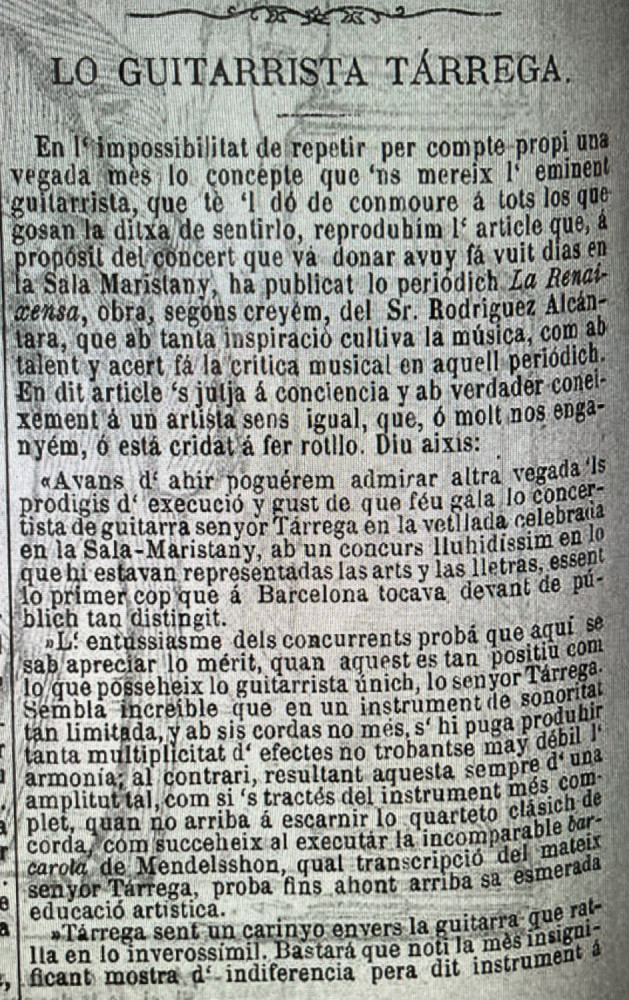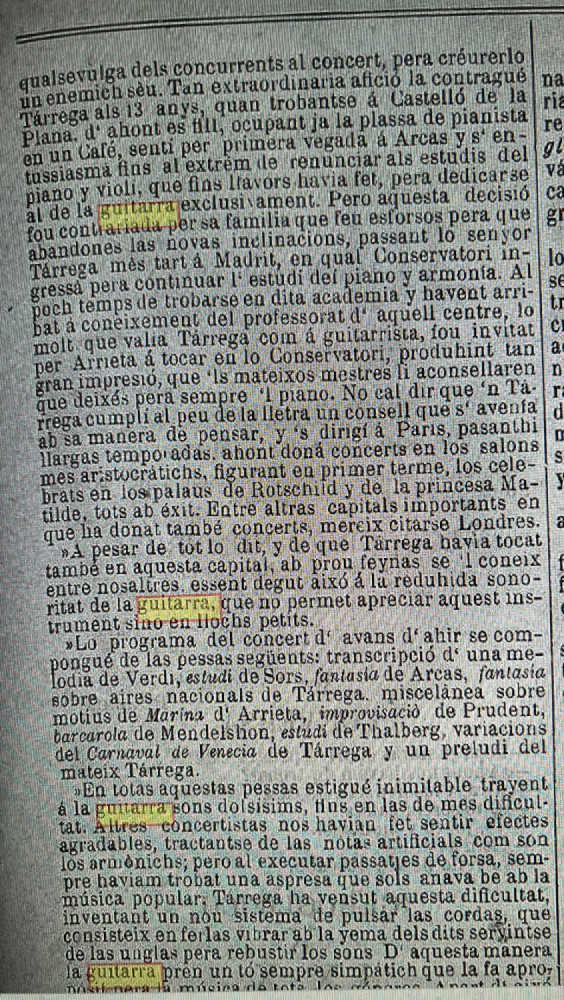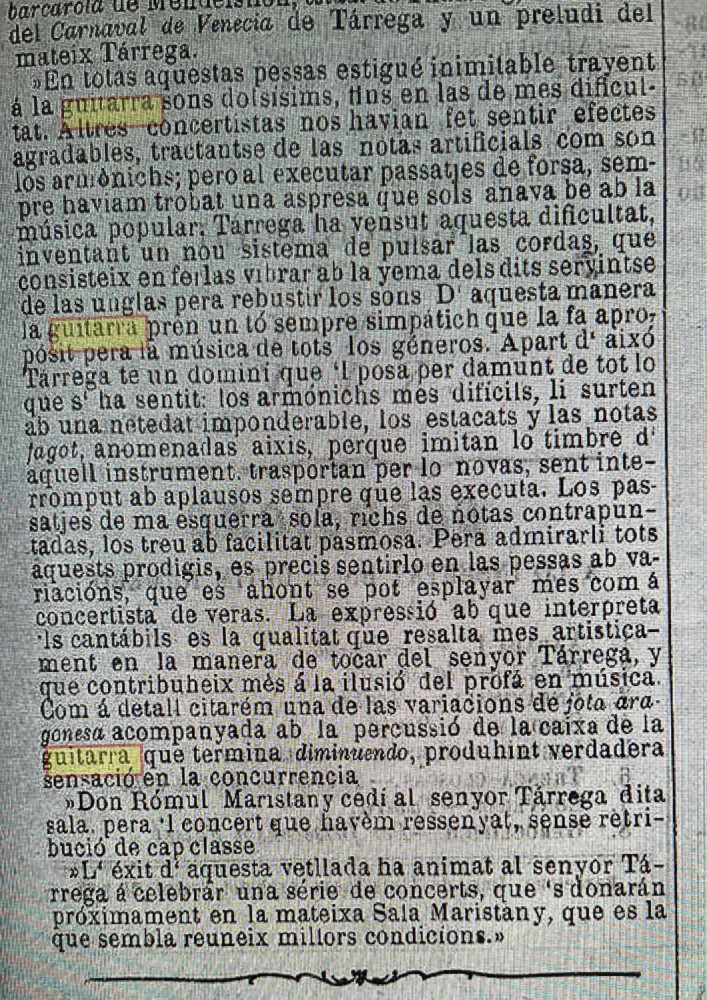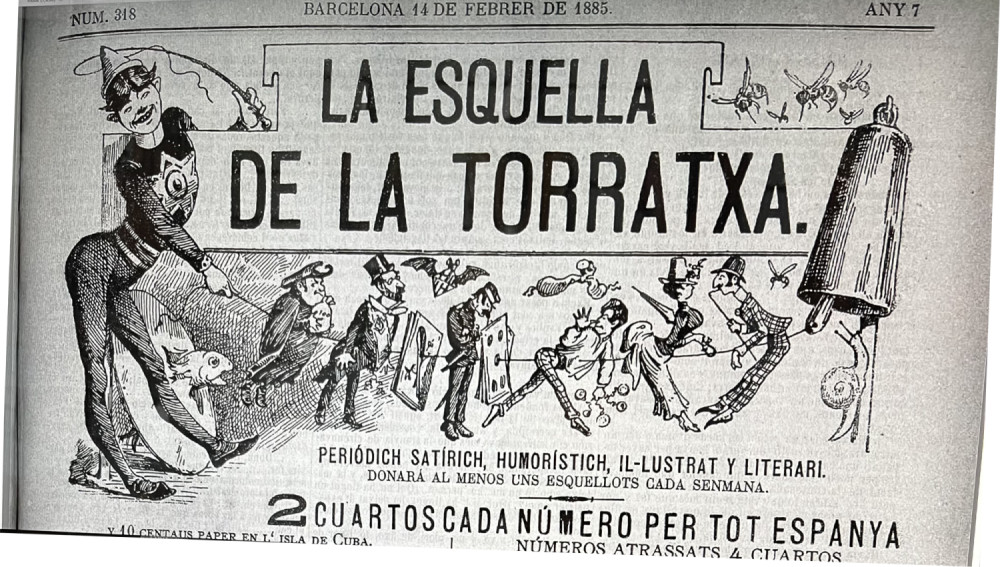1885 Francisco Tarrega Guitar Concert in Barcelona
Francisco Tarrega Guitar Concert Review February 6, 1885
In the newspaper "La Esquella de la Torratxa": Núm 0318 (14 febr. 1885) Barcelona: I. López, page 1, on February 14, 1885 was a copy of a Francisco Tarrega concert review from "La Renaixensa" published by Mr. Rodríguez Alcántara in Catalan:
THE GUITARIST TàRREGA. In the impossibility of repeating the concept on our own once more that the eminent guitarist deserves, who has the ability to move all those who dare to hear him, we reproduce the article that, for the purpose of the concert that he gave eight days ago today in the Sala Maristany.
Mr. Rodríguez Alcántara, has published the newspaper "La Renaixensa", the work, as we believe, of who cultivates music with as much inspiration as he does musical criticism in that newspaper with talent and accuracy. In this article, we conscientiously judge and with true knowledge an artist without equal, who, either we are very deceived, or he is called to make a role. It says like this:
"Once again, the day before yesterday, we were able to admire the prodigiousness of execution and taste that Mr. Tàrrega's guitar concert showed in the evening held in the Sala-Maristany, with a brilliant contest in which the arts and letters were represented, being the first time he played in Barcelona in front of such a distinguished audience.
The enthusiasm of the participants proves that here you know how to appreciate merit, when it is as positive as what the unique guitarist, Mr. Tarrega, possesses. It seems incredible that in an instrument of such limited sonority, and with no more than six strings, such a multiplicity of effects can be produced without finding the harmony weak; on the contrary, this always resulting in such an amplitude, as if it were the most complete instrument, when it does not come to mock the classical string quartet, as it happens when performing Mendelssohn's incomparable "Barcarola", which Mr. Tarrega himself transcribed, proves how far his careful artistic education goes.
Tarrega is a sweetheart towards the guitar that scratches in the improbable. It will be enough for him to notice the most insignificant show of indifference for the said instrument to any of the participants at the concert, to believe him to be his enemy. So extraordinary I became a fan of the Tarrega at the age of 13, when I was in Castello de la Plana. where he is its son, already occupying the place of pianist in a Cafe, he hears Arcas for the first time and is enthusiastic to the point of renouncing the studies of piano and violin, which he had done until then, in order to devote himself exclusively to the guitar. But this decision was opposed by his family, who made efforts to get him to abandon his new inclinations, sending Mr. Tarrega later to Madrid, where he entered the Conservatory to continue his piano and harmony studies. Shortly after being in the said academy and having come to the knowledge of the teaching staff of that center, how much Tarrega was worth as a guitarist, he was invited by Arrieta to play at the Conservatory, producing such a great impression that the same teachers advised him that he should leave the piano. It goes without saying that Tarrega follows the advice to the letter, which is contrary to his way of thinking, and he heads to Paris, where he spends long periods there, where he gives concerts in the most aristocratic salons, appearing in the first rank, those celebrated in the palaces of Rothchild and Princess Matilde, all with success. Among other important capitals in which he has also given concerts, London deserves to be mentioned.
In spite of everything said, and that Tarrega had also played in this capital, he is hardly known among us, this being due to the reduced sonority of the guitar, which does not allow this instrument to be appreciated except in small places.
The advance program for yesterday's concert is composed of the following pieces:
Transcription of a Verdi Melody
Study by Sor
Fantasia by Arcas
Fantasia on national airs by Tarrega (Flamenco pieces)
Miscellany on motifs of the Zarzuela "Marina" by Arrieta
Improvisario by Prudent
Barcarola by Mendelssohn, Study by Thalberg,
Variations from "Carnival of Venice" by Tarrega
Prelude by Maestro Tarrega.
In all these pieces he is inimitable, bringing to the guitar sonorous sounds, even in the most difficult ones. Other concert players had made us feel pleasant effects, they are artificial notes such as harmonics; but when performing passages of force, we had always found a roughness that only went well with Flamenco popular music. Tarrega has overcome this difficulty, inventing a non-system of pulsing the strings, which consists of making them vibrate with the fingertips using fingernails to reverberate the sounds. music of all genres. Apart from that, Tarrega has a domain that puts him above everything that has been heard: the most difficult harmonics. the staccatos and the bassoon notes, so called because they imitate the timbre of that instrument, they come out with imponderable clarity, they carry the news stars, being interrupted by applause whenever he executes them. The passages made by the left hand alone, rich in contrapuntal notes, he pulls them off with amazing ease, To admire all the prodigiousness, it is necessary to hear him in the pieces with variations, that here you can enjoy him more as a real concert performer. The expression with which he interprets the cantables is the quality that stands out most artistically in Mr. Tarrega's way of playing, and that contributes the most to the illusion of the music teacher. As a detail we will quote one of the variations of the Jota Aragonesa accompanied by a guitar box percussion (Tambour), that ends in diminuendo producing a real sensation in the audience.
Mr. Romul Maristany gave Mr. Tarrega the said room for the concert we have reviewed, without remuneration of any kind.
"The success of this event has encouraged Mr. Tarrega to hold a series of concerts, which will be held soon in the same Sala Maristany, which seems to have the best conditions."



